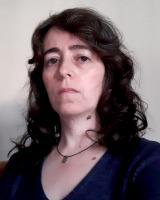Degree: Master
Bio
Cidália M. V. André. Completed the MSc in Teaching Physics and Chemistry in the 3rd Cycle of Basic Education and in Secondary Education in 2023 at the University of Porto, Faculty of Science, and a degree in Chemical Engineering in 1996 at the University of Porto, Faculty of Engineering. Is a research fellow at the University of Porto, Faculty of Science in the Chemistry Research Centre of the University of Porto (CIQUP) and is a PhD student in Science Education and Communication at the same institution. The areas of interest include physics and chemistry education, science communication and exploring the STEM approach in chemistry education.
Projects
This CIQUP member does not yet have any projects linked with him.Publications
Total 2 publications.
Article, Indexed in: crossref, wos DOI: 10.21577/0100-4042.20250077
 P-017-GAF
P-017-GAF
Article in Press, Indexed in: crossref, scopus, unpaywall, wos DOI: 10.1021/acs.jchemed.4c00424
 P-017-5YZ
P-017-5YZ

